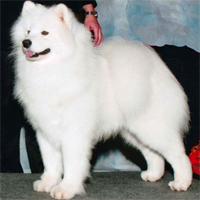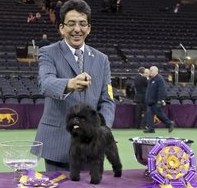Earlier this month, judges at the 137th Westminster Kennel Club Dog Show crowned champion Affenpinscher Banana Joe “Best in Show” after two days of pomp and pageantry.
But was the world’s most prestigious dog show the site of a much more sinister occurrence?
Some are crying foul after a champion Samoyed who was competing at the event died only days after the show — and his owners and handler are claiming their prized pup was poisoned.
Cruz, a fluffy white pup who was so pampered his paws barely ever touched pavement and his crate never saw the inside of a plane’s cargo hold, spent the evening of his big competition enjoying a steak with his handler at their Midtown Manhattan hotel. The 3-year-old Samoyed was in peak condition, ready for his turn in the big ring.
But only days later, the healthy show dog began coughing up blood, and by the end of the week the once-promising canine star was dead. The circumstances behind his passing are mysterious enough to raise questions in the minds of those Cruz left behind.
One of Cruz’s owners, Lynette Blue, contacted the New York Police Department after he dog’s death.
Cruz’s handler, Robert Chaffin, tells the New York Times he was by the Samoyed’s side for practically every moment of their trip and kept a close eye on his fluffy pal the entire time. Still Chaffin has his own theory about who he feels is behind Cruz’s tragic — and he feels, suspicious — death.
While Chaffin says he has no conclusive evidence of a deliberate poisoning, and he acknowledges Cruz could have accidentally ingested the toxic substance that led to his death, the veteran handler still feels the culprit may be one of the extreme animal rights activists who attended the WKC extravaganza to protest what they believe is inhumane treatment of animals.
But why would someone who concerns himself or herself with saving animals poison a dog? Chaffin says he recalls being at the receiving end of a Westminster attendee’s biting disapproval because Cruz’s vocal chords had been removed in a controversial procedure known as debarking. Chaffin wonders if this encounter may have provided the motivation or opportunity that led to Cruz’s untimely death.
“It would have been easy for someone to throw something in his cage,” Chaffin insists.
“Unfortunately, dog shows have been plagued by some of these people for years,” Chaffin says of the protesters. “I’ve heard horror stories about other people’s dogs having their setups tampered with, being poisoned, but I never thought it would come to me.”
But Ingrid Newkirk, the founder and president of People for the Ethical Treatment of Animals (PETA), acknowledges that her organization has sent representatives to the Westminster Kennel Club Dog Show and other purebred competitions in the past to pass out pamphlets and speak out against the event, but insists PETA was not responsible for Cruz’s death.
“PETA does not sanction that,” Newkirk said. “It’s so scurrilous; it’s so low to even suggest it.”
While experts suggest possible alternative theories as to why Cruz lost his life — perhaps an undiagnosed genetic condition, perhaps hemophilia — Blue is not buying it, sure that her prize-winning pooch was poisoned. Veterinarians treating Cruz say his symptoms suggested he had ingested rat poison.
A necropsy was not performed on Cruz’s body, so the “whodunit?” will likely never be solved. “It’s devastating,” Blue says. “We keep thinking of the various scenarios, and it’s starting to feel like something we may never know.”
If Cruz was poisoned, it would not be the first time dogs were mysteriously poisoned at a Westminster Kennel Club Dog Show; back in 1895, eight competing dogs were poisoned the morning of the competition.
Source: NYTimes.com









